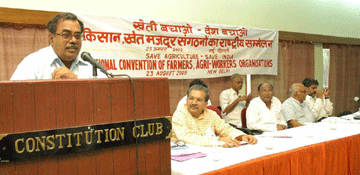 People's Democracy
People's Democracy
(Weekly
Organ of the Communist Party of India (Marxist)
No. 35
August 28, 2005
(Weekly
Organ of the Communist Party of India (Marxist)
|
Vol.
XXIX
No. 35 August 28, 2005 |

AIKS general secretary K Varadharajan addressing the convention
A
CONVENTION of the Left-led kisan and agricultural workers unions gave a call of
countrywide “rasta roko and rail roko” agitation by kisans and agricultural
workers on September 29. This agitation coincides with the countrywide strike on
September 29 called by the central trade unions. It also resolved that the rasta
roko and rail roko programme would be preceded by a fortnight-long campaign all
over the country starting from September 1, the Kisan Day.
The
convention can best be summed up in the words “Save Agriculture and Save
India” for which the bugle was sounded by various organisations cutting across
the political affiliations.
The
convention, held on August 23 at the Constitution Club, New Delhi, was attended
by a large number of leaders and activists of various organisations from
different states. Besides the Left-led unions, non-Left organisations like
Bharat Kisan Samaj, Shetkari Sangarshna, Maharashtra, and Bharatiya Kisan Union
also took part in the convention.
The
national convention registered its strong protest against the growing attacks on
the livelihood of peasants and agricultural workers by the policies of
liberalisation, globalisation and corporatisation being implemented by the
central government and a number of state governments under the dictates of World
Bank-WTO.
The
convention opened with the speech of Atul Kumar Anjan, general secretary of AIKS
(4 Windsor Place). In his inaugural speech, he emphasised the need of unity of
various organisations cutting across the political lines and the need of the
militant united struggles all over India to save agriculture and thus save
India.
In
all, 13 resolutions pertaining to the burning issues confronting the rural
masses of the country were passed by the convention.
WTO’s
HONG KONG MINISTERIAL MEETING
K
Varadha Rajan, general secretary of AIKS, while moving the resolution on the
coming Hong Kong ministerial meeting of WTO, cautioned the people of India about
the new attacks planned by the developed countries in the coming meeting to
further loot the developing countries of the world by bringing new tariff
regulation etc. He detailed the experience of last few years about crash in
prices of agricultural crops due to dumping of heavily subsidised agricultural
products by the imperialist countries and multinational companies of the
developed countries.
After
Krishna Bir Chowdary, executive president of Bharth Kisan Samaj, seconded the
resolution, the convention adopted it unanimously. The resolution demanded a white paper from the UPA government detailing the
stand to be taken in Hong Kong. It also demanded consultation by the central
government with various kisan and agricultural workers organsations before the
Hong Kong meet.
A resolution on the latest attacks on the peasantry was moved
by AIKS joint secretary N K Shukla. He demanded that the government of India
should withdraw the Seed Bill 2004, which is a blatant attack on the basic right
of farmers of the country to grow, use, exchange and sell their farm seeds. At
the same time the bill gives all production rights to private companies,
including MNCs, to capture the Indian seed market. The resolution also demanded
the government to stop their latest move to cut food subsidies and fertiliser
subsidies. The resolution was adopted unanimously after it was seconded by
Debabrata Biswas, MP and leader of AIAKS.
AIAWU
joint secretary Suneet Chopra introduced a resolution on ‘Comprehensive
legislation for agricultural labour and Against the reversal of land reforms’.
Explaining the plight of rural poor, he appealed to the democratic masses of the
rural India, especially people belonging to scheduled caste and tribes who are
the worst affected, to come forward to launch a militant mass resistance against
evictions.
After
the resolution ‘Call of the convention for ‘road roko, rail roko on Sept
29’ was adopted, AIKS president S Ramachandran Pillai, made the concluding
speech. He traced the development in the country particularly of the
agricultural sector since 1947. He explained that this can be seen in two phases
– one, the development upto 1991 and another post-1991. Before 1991, the
ruling classes aimed at development of agriculture in India through government
intervention. Therefore the government made big investments for developing
infrastructure for agriculture. It had control over fertiliser and other inputs
supply and also on the agricultural produce market. Though all these
interventions and actions of the government mainly helped the richer sections of
the rural India, it definitely helped in increasing production and food security
of India, said Pillai. With 70 per cent of the people living in rural India
being producers and consumers of agriculture, the government’s intervention
played significant role in the development of agriculture up to 1991, despite
all its weaknesses.
But
now the ruling classes, at the dictates of the WTO, made the government to
withdraw from its responsibilities towards agricultural sector, leaving the life
of crores of rural people to the destiny of the market. The experience since
1991 clearly proved that the new policies are affecting various sections of the
peasantry, with the worst affected being the rural poor. Pillai congratulated
all the peasant and agricultural workers organisations for coming together in
spite of their differences on some policy issues. He called for further widening
and deepening of this unity at the state level.
The
presidium of the convention consisted of S Ramachandran Pillai (AIKS), C K
Chandrappan MP (AIKS – 4 Windsor Place), A Vijaya Raghavan MP (AIAWU), Hiten
Burman MP (AIAKSU), Abani Roy, MP (SKS), Harish Gupta (AIAKS), Krishna Bir
Chowdhary (BKS), Vijay Jawandia (Shetkari Sanghatana) and Rakesh Tikait (BKU).